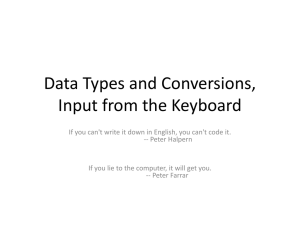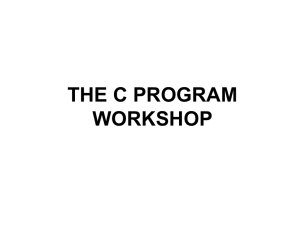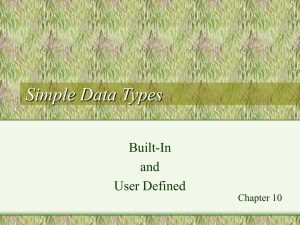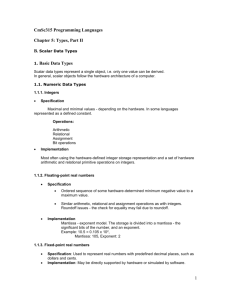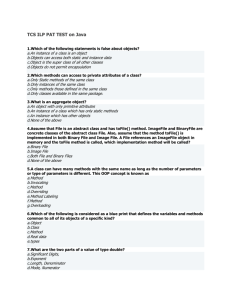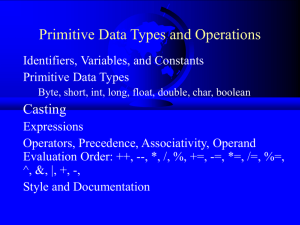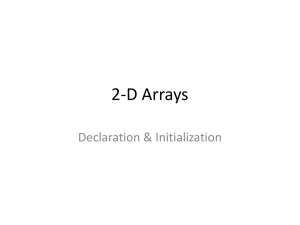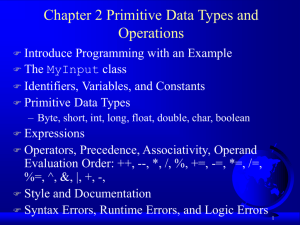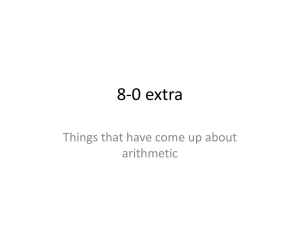week_3 - METU Computer Engineering
advertisement
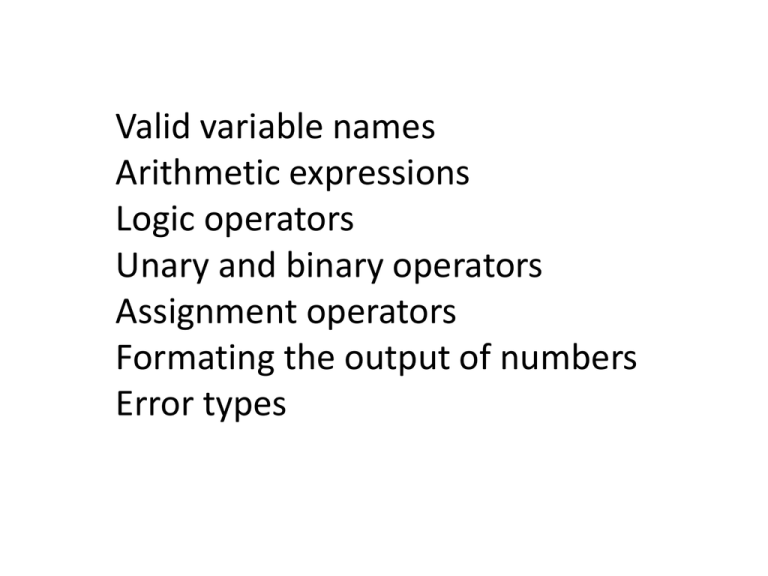
Valid variable names Arithmetic expressions Logic operators Unary and binary operators Assignment operators Formating the output of numbers Error types Elements of a C program int1 and Int1 are not the same identifiers/variables C has the following basic built-in datatypes. int float double char int first, second; scanf("%d%d", &first, &second); double miles; /* distance in miles scanf("%lf", &miles); */ Type conversions (casting) float a = 5.25; int b = a; /*Casting from float to int. The value of b here is 5*/ char c = ‘A’; int x = c; /*Casting from char to int. The value of x here is 65: the ASCII code of ‘A’*/ int x=7, y=5 ; float z; z=x/y; /* the value of z is 1.00 */ int x=7, y=5; float z; z = (float)x/(float)y; / the value of z is 1.4*/ Type conversions (casting) printf( "Welcome : %d", (3/2) ); Output is : 1 and fraction part of the number is lost int sum = 17, count = 5; double mean; mean = (double) sum / count; printf("Value of mean : %f\n", mean ); Value of mean : 3.400000 int i = 17; char c = 'c'; /* ascii value is 99 */ int sum; sum = i + c; printf("Value of sum : %d\n", sum ); Value of sum : 116 What is the result of printf("%d", ‘d’– ‘a’ ); ! exclamation mark = is assignment and == is an equality operator Assignment operators = += -= *= /= %= a+=10; is the same with a=a + 10; Logic operators && AND || OR if( (a > = 25) || (b==4) ) if( (a > = 25) && (b!=4) ) = -5 =1 Formating the output of integer values Formating the output of double values Errors Compile time Syntax errors •When the code violated the grammer rules of C. •Compiler detecs these errors Run-time errors •happen when the program directs the computer to an illegal operation. •Such as Division by zero Logic errors •A faulty algorithm •It gives no error message. Run-time error (division by zero) If the value of variable “second” is given as zero Logic error Data Type of an Expression The data type of an expression depends on the type(s) of its operands. if both operands are int int otherwise double An expression that has operands of both type int and double is a mixed-type expression . The data type of such a mixed-type expression will be double . When an assignment statement is executed, the expression is first evaluated; then the result is assigned to the variable listed to the left of the assignment operator ( = ). Either a type double or a type int expression may be assigned to a type double int m, n; double p , x , y; m = 3; n = 2; p = 2.0; x = m / p; y = m / n; 3/2.0 3/2 Sample questions ( be careful that the values are integers) Hint: b--/2*3%2*4 : execute this part from left to right This one is first executed Homework Write a program that: 1. Reads two integers and two float numbers from the user 2. Writes examples with preincrement (++a), postincrement operators (a--). 3. Writes examples with += and -= operators 4. Casts the integers to float values and writes results 5. Writes the result of the expression 3+(17*2-9)/2*3-29/2 Send the C file to my address (tanseldoker@yahoo.com.tr)

